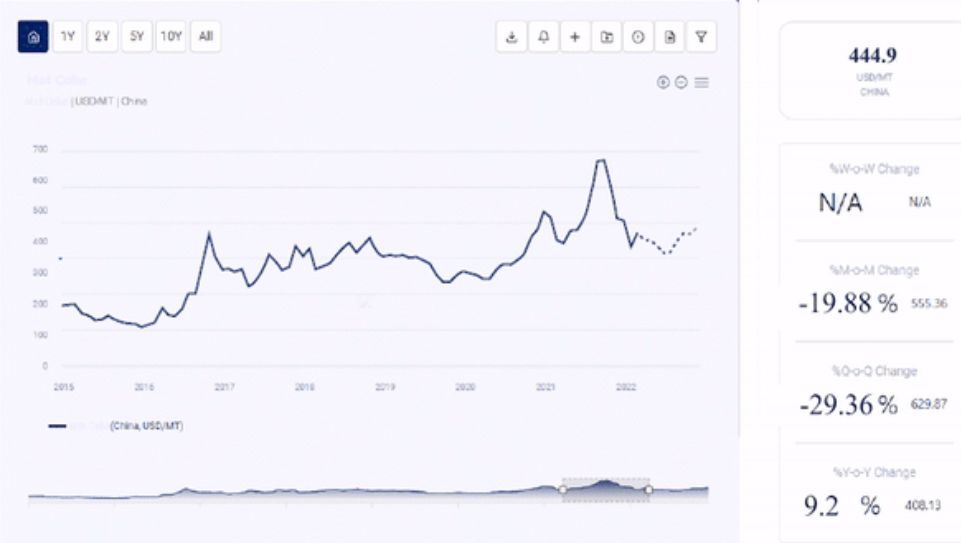Polybutylene Succinate Market Analysis, Historical | Provided by Procurement Resource
| Report Features | Details |
| Product Name | Polybutylene Succinate |
| Supplier Database | MCPP (Mitsubishi), Showa Denko, Eastman Chemical Company, BioAmber Inc., DowDuPont |
| Region/Countries Covered |
|
| Currency | US$ (Data can also be provided in local currency) |
| Post-Sale Analyst Support | 360-degree analyst support after report delivery |
Request for Real Time Polybutylene Succinate Prices: https://www.procurementresource.com/resource-center/polybutylene-succinate-price-trends/pricerequest
PBS, also known as polybutylene succinate, is a semi-crystalline thermoplastic polymer that belongs to the polyester family. The chemical formula of polybutylene succinate is (C8H12O4) n and its melting point is 1.26 g/cm3.
It is produced by the condensation of succinic acid with 1,4-butanediol. Due to the fact that PBS is a biopolymer, it may completely decompose into water, carbon dioxide, and biomass and is therefore easily disposed of with other organic wastes.
The polymer is widely used in many industries because of its great cost-effectiveness and mechanical similarities to polyethylene. PBS is created through the direct esterification of succinic acid with 1,4-butanediol. The diol and diacid are first esterified to yield PBS oligomers. To produce higher mass polymers, these oligomers are subsequently trans-esterified under vacuum using titanium or germanium derivatives as catalysts.
Malaysia, Germany, Vietnam, Taiwan, China, Japan, and Singapore are the major producing countries in the market of polybutylene succinate.
Key Details About the Polybutylene Succinate Price Trend:
Procurement Resource does an in-depth analysis of the price trend to bring forth the monthly, quarterly, half-yearly, and yearly information on the polybutylene succinate price, sunflower seed price and neopentyl glycol price etc. in its latest pricing dashboard. The detailed assessment deeply explores the facts about the product, price change over the weeks, months, and years, key players, industrial uses, and drivers propelling the market and price trends.
Each price record is linked to an easy-to-use graphing device dated back to 2014, which offers a series of functionalities; customization of price currencies and units and downloading of price information as excel files that can be used offline.`
The polybutylene succinate price trend, pricing database, and analysis can prove valuable for procurement managers, directors, and decision-makers to build up their strongly backed-up strategic insights to attain progress and profitability in the business.
Industrial Uses Impacting Polybutylene Succinate Price Trend:
 PBS naturally breaks down into water and carbon dioxide. It serves as a biodegradable substitute for some typical polymers. PBS was the first material to be processed into films, bags, or boxes for use in packaging for both food and cosmetics.
PBS naturally breaks down into water and carbon dioxide. It serves as a biodegradable substitute for some typical polymers. PBS was the first material to be processed into films, bags, or boxes for use in packaging for both food and cosmetics.
PBS has other uses in the manufacturing of throwaway items like dinnerware and medical supplies. PBS is utilised in the creation of mulching films or materials.
It is also employed in the industries like forestry, civil engineering, fishery (for fishing nets), and others. Polybutylene succinate is also being researched for implants and for usage as a biodegradable drug encapsulating system in the medical area.
Key Market Players:
• MCPP (Mitsubishi)
• Showa Denko
• Eastman Chemical Company
• BioAmber Inc.
• DowDuPont
News and Events:
• January 2021: Due to widespread public concern over environmental protection and a future energy crisis (fossil fuels), biopolymers are increasingly replacing petrochemical-based ones in manufacturing. PBS, a new biobased and biodegradable polymer, has generated a lot of attention in a variety of industries. The extreme flammability of PBS, however, is a significant barrier to its possible use. The methods employed for the PBS's flame retardancy are comprehensively evaluated. Inorganic (nano)particles, lignin, and intumescent flame-retardant systems are some of these methods.
Related Reports:
- Polycaprolactam Price Trend - https://www.procurementresource.com/resource-center/polycaprolactam-price-trends
- Linalool Price Trend - https://www.procurementresource.com/resource-center/linalool-price-trends
- Polybutylene Terephthalate Price Trend - https://www.procurementresource.com/resource-center/polybutylene-terephthalate-price-trends
About Us:
Procurement Resource offers in-depth research on product pricing and market insights for more than 500 chemicals, commodities, and utilities updated daily, weekly, monthly, and annually. It is a cost-effective, one-stop solution for all your market research requirements, irrespective of which part of the value chain you represent.
We have a team of experienced analysts who perform comprehensive research to deliver our clients the newest and most up-to-date market reports, cost models, price analysis, benchmarking, and category insights, which help in streamlining the procurement process for our clientele. Our team tracks the prices and production costs of a wide variety of goods and commodities, hence, providing you with the latest and consistent data.
To get real-time facts and insights to help our customers, we work with a varied range of procurement teams across industries. At Procurement Resource, we support our clients, with up-to-date and pioneering practices in the industry, to understand procurement methods, supply chain, and industry trends, so that they can build strategies to achieve maximum growth.
Contact Us:
Company Name: Procurement Resource
Contact Person: Chris Byrd
Email: sales@procurementresource.com
Toll Free Number: USA & Canada – Phone no: +1 307 363 1045 | UK – Phone no: +44 7537 132103 | Asia-Pacific (APAC) – Phone no: +91 1203185500
Address: 30 North Gould Street, Sheridan, WY 82801, USA

Comments
Post a Comment